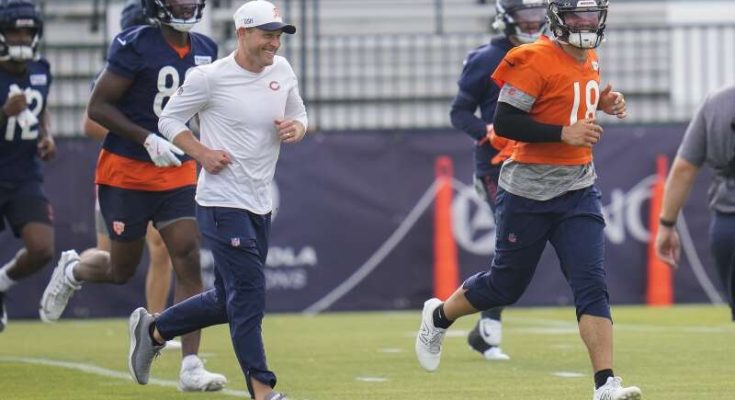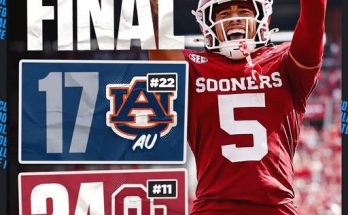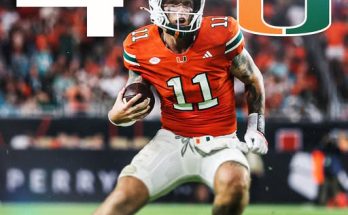The Chicago Bears entered their 2025 training camp with a heightened sense of anticipation and an almost unbearable level of pressure, a concoction that has inevitably led to the predictable yet frustrating reality of growing pains.1 With a new coaching staff, led by the highly-touted Ben Johnson, a new defensive coordinator in Dennis Allen, and a host of new faces on both sides of the ball, the gears of this revamped machine are still grinding to find their rhythm. While the buzz around Halas Hall is palpable, a closer look reveals an offense struggling for consistency and a defense that, despite its moments of brilliance, is still learning to speak the same language. This is not a team on the verge of collapse, but a young, talented group that is experiencing the difficult, often messy, process of formation. The hope that followed the offseason acquisitions and coaching changes is now being tempered by the hard work of making it all come together.
The spotlight, as expected, shines brightest on the offense, which is a complex puzzle of new and familiar pieces. At the heart of this puzzle is quarterback Caleb Williams, entering his second season with the weight of the franchise’s history on his shoulders. The arrival of Johnson, the former offensive coordinator of the rival Detroit Lions, was supposed to be the final piece of the puzzle, a brilliant football mind to unlock Williams’ full potential.2 The early days of camp, however, have been a testament to the steep learning curve that still exists. The offense has been called “sloppy” by Johnson himself, a direct and honest assessment following the team’s Family Fest practice at Soldier Field.3 On a recent full-contact goal-line drill, the offense even committed a safety, a mistake that highlights not just a lack of execution but a fundamental breakdown in communication and focus. Williams, for his part, has shown flashes of the generational talent that made him the first overall pick, but these moments have been interspersed with periods of inconsistency.4 His timing with the new receiving corps is still a work in progress, and the speed of Johnson’s playbook, with its intricate reads and pre-snap calls, is a lot to absorb. While the talent of receivers like DJ Moore and the promising rookie tight end Colston Loveland is undeniable, that trust and chemistry are not built overnight. Johnson has been honest about this, stating that while veterans like Moore and Loveland have his trust, the rookies are “still learning, they’re still growing, and they just haven’t been out there enough to earn that trust yet.”5 This is the essence of the growing pains—the struggle to turn a collection of individual talents into a cohesive, telepathic unit.
The challenges are not limited to the passing game. The running back rotation, which was a point of discussion throughout the offseason, is still in flux.6 While D’Andre Swift brings a dynamic element to the backfield, and Roschon Johnson a powerful presence, the team is still trying to figure out the right combination and workload. The offensive line, which was a point of emphasis in the offseason and is expected to be much improved, is also facing its own trials. The left tackle competition, in particular, is a fierce battle between several players, and the lack of a clear-cut winner at this point in camp signals that stability is still being sought.7 Rookie offensive tackle Ozzy Trapilo, a second-round pick, has been a pleasant surprise and is making a strong push for a starting role, but the position is far from settled.8 The physicality and intensity of camp, particularly with the pads on, are designed to forge these battles, but they also expose weaknesses and highlight the areas where the team needs to get better, and fast.
On the other side of the ball, the defense is also navigating a new era under Dennis Allen. After a late-season surge last year, expectations for this unit are high. Allen, a defensive-minded coach known for his aggressive and blitz-heavy schemes, is instilling a new identity in Chicago.9 The defense has had its moments of dominance in camp, often getting the better of the offense in drills and forcing turnovers. New players like defensive end Dayo Odeyingbo, who signed with the team in the offseason, have praised Allen’s aggressive system, noting how it allows the defensive line to be more disruptive.10 Cornerback Nahshon Wright, a veteran pickup, has also been a standout, competing for a starting role with a fierce intensity that has impressed both coaches and teammates. However, the “growing pains” narrative is not absent on defense. The transition to a new scheme takes time, and the unit is still working out the kinks. A defense that is learning new blitz packages and coverage rotations is prone to the occasional miscommunication, and while they have often gotten the best of the offense, it’s also important to remember that the offense is in an equally challenging transitional period. A true test of the defense’s prowess will come in the preseason, particularly during the joint practices with the Miami Dolphins, where they will get to measure their progress against an outside opponent.
The pressure surrounding this training camp is immense, and it’s a significant factor in these “growing pains.” For a franchise that has been starved for consistent success, every mistake, every miscue, and every moment of disorganization is magnified. Fans and media are looking for signs of a new era, and when those signs are not immediately apparent, the worry begins to set in. The new coaching staff, with its promising pedigree, is under a microscope. Ben Johnson’s move from Detroit to Chicago was a major story, and he is expected to replicate the offensive success he had with the Lions. The public acknowledgement of the offense’s “sloppiness” is both a refreshing moment of honesty and a stark reminder that even the most talented minds need time to build a foundation. The players, too, are feeling the pressure. For a young quarterback like Caleb Williams, the experience of a difficult training camp is part of the maturation process. He is being asked to lead a new-look offense under a new coach, a task that would be challenging for a seasoned veteran, let alone a second-year player. His ability to navigate these early struggles, to learn from his mistakes, and to grow alongside his teammates will be the most crucial storyline of this entire season.
Ultimately, the term “growing pains” is an apt description for what is happening at Halas Hall. It is a period of necessary discomfort and difficult lessons. The Chicago Bears are not a finished product; they are a team in the midst of a significant transformation. The coaching staff is installing new systems, the players are learning to trust each other, and the rookies are fighting for their place in the league. This is the messy, uncomfortable, and absolutely essential part of building a winning culture. The hope is that by the time the regular season begins, these “pains” will have led to a stronger, more resilient team, one that is ready to turn the page on a long history of disappointment and finally fulfill the promise that has been so tantalizingly dangled in front of Chicago fans for so long. The season’s outcome will depend on whether this talented group can push through these growing pains and emerge as a truly cohesive unit.



